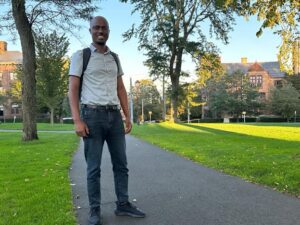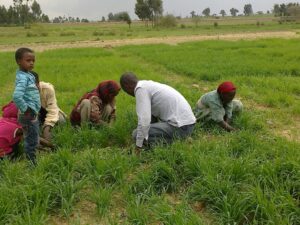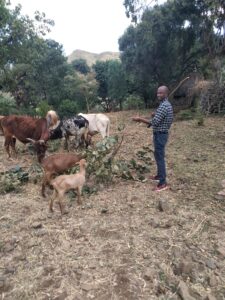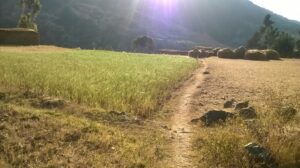
Born in the village of Maygundi in the Tigray region of Ethiopia during the civil war in the 1980s, Gebremedhin Gebremeskel, Haile, witnessed firsthand the struggles faced by his community due to the lack of clean drinking water. Gebremedhin remembers his childhood as a herder, leading his cattle to water sources and fetching water for his family on a donkey’s back.
Growing up, Gebremedhin attended Maygundi Primary School, and later, he completed his Elementary and Secondary School in Enticho town in 2003. During this time, he realized the urgent need for clean water access in his village. As a result, Gebremedhin enrolled in Haramaya University, where he studied soil and water engineering and management for his undergraduate degree and later pursued a Master’s degree in irrigation engineering. His studies equipped him with the necessary skills and knowledge to address water-related challenges in his community and beyond.
Continuing his academic journey, Gebremedhin was granted a scholarship to study physical geography at the University of Chinese Academy of Sciences (China), specializing in hydrology. It was at that time that he embarked on his Ph.D. research, focusing on the issue of drought in Eastern Africa. Gebremedhin’s thesis served as a valuable contribution to understanding the causes and impacts of drought in the region.
While Gebremedhin was dedicating his time and energy to his studies, the plight of his home village and Tigray did not go unnoticed. The lack of clean water continued to plague the people, leading to numerous cases of waterborne diseases among the villagers. After completing his studies, Gebremedhin began working as a water resources researcher at the Tigray Agricultural Research Institute. In this role, he contributed to the design and implementation of research projects to improve the region’s water access to irrigation and clean water supply.
In a fortuitous turn of events, he met his wife, Aregay Kidanu Alemayoh, a hydrogeologist working for the Tigray Relief of Society (REST). Aregay and her colleagues at the REST formed a formidable team, working hand in hand to bring safe water to rural communities across Tigray, partnered with donors including Water TO Thrive and Well Wisher, among others. Through their efforts, hundreds of hand-dug wells have been built in Tigray, providing communities with clean and accessible water sources. Gebremedhin’s village, Maygundi, is among the beneficiaries where water points have been constructed with hand-dug wells by REST through the help of Water To Thrive. Thanks to Water To Thrive, his parents and community have had access to clean water for over ten years. As a result, the success of their projects and the transformative impact it has had on thousands of lives have significantly impacted society.
When Gebremedhin heard that Water To Thrive is marking its 15th anniversary, he was grateful for the support of this organization and its founders, particularly Dick Moeller and his team, whose unwavering commitment to addressing the clean water crisis has been an inspiration to the rural communities in Tigray. Gebremedhin is also grateful to the donors and funders of Water To Thrive for making access to clean water in Tigray a reality.
Gebremedhin is now an assistant Earth and Environmental Science professor at Wesleyan University, United States. He is also an editor for the journal Climatic Change. He is currently serving as an ambassador for Water To Thrive in the United States and beyond since 2023.


